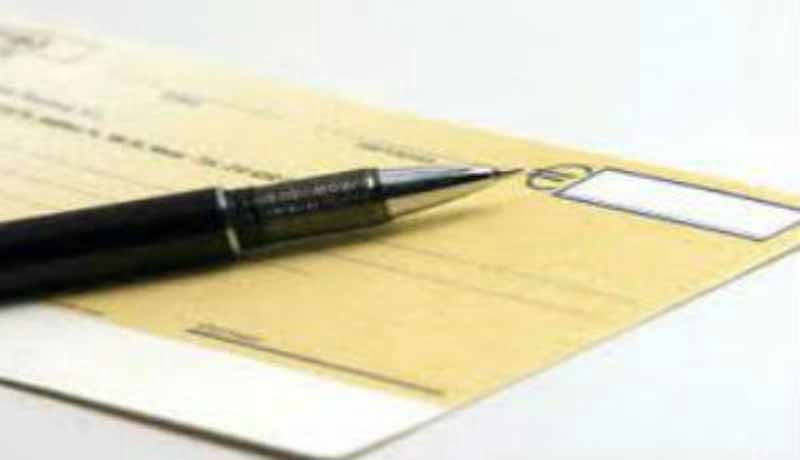Practice of Collecting Undated Cheques from Assesses is ‘Illegal’: Delhi HC warns Excise Officials [Read Judgment]

PIL – Lockdown – cheques – DD – Taxscan
PIL – Lockdown – cheques – DD – Taxscan
Recently, in DIGIPRO Import & Export Pvt. Ltd v. Union of India & Ors, the Delhi High Court criticized the Excise Department Officials for collecting undated cheques from assesses.
The bench termed such action as “Illegal practice” which requires a deep investigation. The was hearing a writ petition filed by the assessee before the High Court.
The petitioner-company, manufactures mobile phone batteries, chargers and LED bulbs, was paying excise duty @ 2% ad valorem on mobile phone battery and mobile phone charger, and 6% on LED bulbs. However, the respondents claimed that the tariff rate of duties on these products is 12.5% ad valorem. According to the petitioners, they were eligible to avail an exemption as per a notification issued in March 2012 by the Central Excise department. In consequent to a search conducted by the Anti-Evasion Wing of Central Excise, Delhi some documents was seized and the officials collected five undated cheques amounting to a total of Rs. 12.5 crore. Later, the petitioner submitted a Notification allowing him to avail an exemption on excise duty before the Additional Commissioner (ADC). In response, the Officer issued the following directions:
“(i) Please realise the cheques early. (ii) Please quantify duty liability (iii) Please put up file as soon as cheque is realised.”
Subsequently, summons was issued to the petitioner, he asked the Department not to encash the cheques, and approached the High Court praying for a direction that he is eligible for exemption under the aforesaid notification, and for another direction to the Central Excise not to encash the five cheques.
Upon direction from the Court, the Department produced the cheques before the Court. It further asked the officials to highlight the orders by which officers were allowed to collect undated cheques. In response, ADC stated that,
“…at the time of tendering the cheques, the petitioner requested for some time for making good the payment and stated that since he is not having sufficient balance/funds with him at that point of time…The petitioner, therefore, requested that no date may be put on the cheques and as and when the petitioner would have sufficient balance, he would inform the deponent and accordingly the deponent may encash these cheques. On getting the assurance from the petitioner, the officer who visited the premises of the petitioner, agreed not to put any date on the cheques.”
Dissatisfied by the response from the department official, the bench asked the Senior Standing Counsel for Department to produce the same. He, however, was unable to show any orders or notification.
Justice S Muralidhar and Justice Chander Shekhar said that,“It is indeed extraordinary that officers at the level of a Superintendent would have such vast powers of collecting duty on the spot without even a quantification of the duty amount preceded by a show cause notice (SCN). No attempt has been made to demonstrate that the above is a procedure known to law. It actually points to the opposite. And that is what makes it inexcusable.”
The Bench also warned “serious consequences” against the Anti-Evasion Wing should this practice continue unchecked. “This illegal practice adopted by the Anti-Evasion Department of Central Excise requires a deeper investigation. The Court has every reason to believe that this has come to light only because the Petitioner has approached this Court. This practice is perhaps being adopted in a number of instances which are yet to come to the notice of the Court. There will be serious ramifications if this practice is allowed to continue unchecked.”
“At least two scenarios are possible when such unbridled power of ‘collection’ of duty, on the spot, is allowed to go unchecked. One is that since there is nothing written down anywhere, the unscrupulous officers who constitute the survey/search team can ‘negotiate’ an amount of evaded duty and also agree to waiver of interest and penalty…
…The second scenario is where an Assessee refuses to comply with an illegal demand and under threat and coercion is compelled to issue cheques or pay cash which is supposed to constitute the differential duty.
This is undoubtedly prejudicial to the Assessee and is harmful to public interest. It is not rule of law but anarchy unleashed by holders of public office. Neither is it an acceptable scenario in a system governed by the rule of law. It metamorphises into a system of rule by law and, worse still, by abuse of law. It has to be stopped.”
Allowing the petition, the bench summoned the Commissioner of Central Excise, Delhi-II and directed him to file an affidavit showing the steps taken to curb this practice. He was also directed to conduct an enquiry immediately to find out which officers performed the “illegal exercise”. The bench further directed that a copy of this order be sent to the Central Vigilance Commissioner (CVC) in view of the seriousness of the issue. It said, “The extent of harm this can cause to the government exchequer and the harassment it can cause to innocent persons is immense. It symbolises what economists term as ‘rent seeking behaviour’ of public servants. It also raises serious issues about accountability and transparency of the functioning of these Departments. It is imperative for the CVC to issue clear guidelines.”
Read the full text of the Judgment below.


